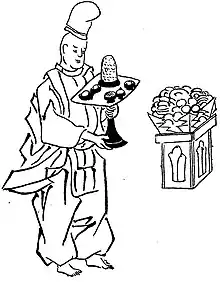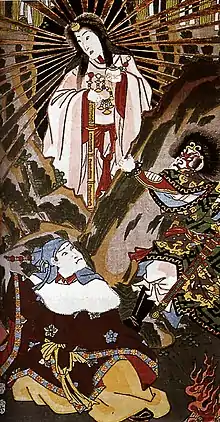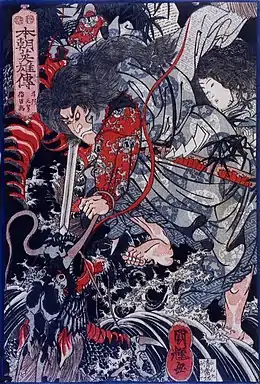Omoikane (Shinto)
Omoikane (思兼 or 思金) is a Shinto god of wisdom and intelligence. His name means "serving one's thoughts."
| Omoikane | |
|---|---|
god of wisdom and intelligence | |
 | |
| Parents | Takamimusubi |
He is known by other names as Tokoyo-no-Omoikane (常世思金神) in the Kojiki (古事記); Omoikane (思兼神) in the Nihon Shoki (日本書紀); Omokane (思金神, 思兼神), Tokoyo-no-Omoikane (常世思金神), Yagokoro-omoikane (八意思兼神, 八意思金神) in the Kujiki (旧事紀 or Sendai Kuji Hongi 先代旧事本紀), or Achihiko (阿智彦).
He is the son of creator deity Takamimusubi[1] (高御産巣日神) and the older brother of Takuhatachiji-hime (栲幡千千姫命, or commonly named in the Kojiki: 万幡豊秋津師比売命 Yorozuhatatoyo'akitsushi-hime), who is the wife of the deity Ame-no-Oshihomimi (天忍穂耳命).
However in the Kujiki (旧事紀 or Sendai Kuji Hongi 先代旧事本紀). Omoikane descends to Shinano Province (信濃国 Shinano-no-kuni, a former province that is now Nagano Prefecture) to become the ancestor Shina-no-achihouri (信之阿智祝) and as in Chichibu Province (知々夫国, Chichibu no kuni), a former province in Saitama Prefecture. He then becomes the father of both deities Ame-no-Uwaharu (天表春命) and Ame-no-Shitaharu (天下春命), also through this lineage become the patriarchal ancestor of the children of Ama-no-Koyane (天児屋命, 天児屋根命).
deliberations of the heavenly deities. In the myth where Amaterasu hid in a cave, he was tasked to find a way to get her out.[2]
Appears to have descended from the heavens in the heavenly descent myth. OMOI, id., "think"; KANE, id., "metal," but preferably from the verb "to combine," "to possess simultaneously." "Thought-Combining Deity," a deity of wisdom or good counsel able to hold many thoughts at once or to combine in one mind the mental powers of many individuals. In the Kojiki the name is Ya-gokoro-omoi-kane-no-mikoto, "Many-Minds'-Thought-Combining Deity." Also called Toko-yo-no-Omoikane-no-kami.[3]
References
- "Encyclopedia of Shinto - Home : Kami in Classic Texts : Omoikane". eos.kokugakuin.ac.jp. Retrieved 2020-12-11.
- "Omoikane • A History of Japan - 日本歴史". A History of Japan - 日本歴史. Retrieved 2020-10-11.
- Donald L. Philippi: "KOJIKI: Translated with an Introduction and Notes", page 540, University of Tokyo Press, 1968

